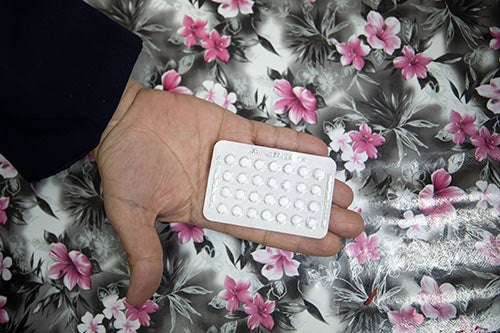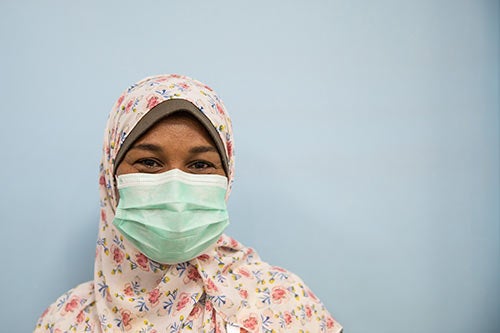News
In Egypt, family planning unit works to ensure continuity of services amid pandemic
- 20 November 2020
News
CAIRO, Egypt – This year, Nashwa Mohamed has adopted a new ritual at work: She sits at her desk, looks at her notebook, picks up her phone and calls women who have stopped receiving contraceptives due to the COVID-19 pandemic.
Ms. Mohamed is an outreach worker at the Ahalina Family Planning Unit on the outskirts of Cairo.
“You haven’t been coming and I know it is out of your hands because of the current circumstances,” she said to a woman on the other end of the line. “I am calling you to make things easier for you.”
These phone calls are part of Egypt’s efforts to meet the needs of women at a time when contraceptive services are seriously compromised. Around the world, family planning and contraception are among the most frequently disrupted health services, according to the World Health Organization.
Some 7 in 10 countries are experiencing disruptions.
Dr. Jihane Edward, head of the Family Planning Department at al-Salam city, said that, when lockdown measures were first taking place, her team immediately gathered to devise ways to ensure continuity of care.

Today, as Egypt braces for a second wave of COVID-19 cases, this work remains as critical as ever.
Dr. Azza Ahmed, head of the Ahalina Medical Centre, says the number of women seeking family planning care has remained consistent in recent months, but that in-person services have been limited. Only around 20 people are allowed into the centre each hour for the centre’s various services, including family planning.
During her outreach calls, Ms. Mohamed informs women that they can opt for long-acting contraceptives. Women can also take home more monthly cycles of oral contraceptives to reduce the frequency of their visit to the facility.
“We either provide two packs of pills instead of one … or we provide contraceptive implants which can last up to three years, or IUDs which can last up to 10-12 years,” she explained.
Infection control measures are also in place for those who need on-site care.
A few weeks ago, Doaa Ramadan came in for a routine check-up. “I can also get answers to questions I have,” she said.
The measures to prevent COVID-19 transmission put her at ease.
“Everyone here is wearing a facemask, the [service providers] wash their hands and the nurses make sure everyone is maintaining a distance between one another,” Ms. Ramadan said.

In the waiting room, Ms. Mohamed and other outreach workers take turns giving seminars on different topics related to reproductive health.
“We are trained on different topics, all of which are related to women,” she said.
Family planning is at the top of the agenda, but she also addresses female genital mutilation, breastfeeding and other issues.
The unit receives support from UNFPA and the European Union, including contraceptive supplies, outreach support and training for staff.
Ms. Mohamed and her colleagues say they are committed to their collective goal of empowering women to make informed choices about their reproductive health, no matter the circumstances.
At her desk, she carefully crosses another name off her list as she hangs up the phone.
“I will see you tomorrow, then,” she said.